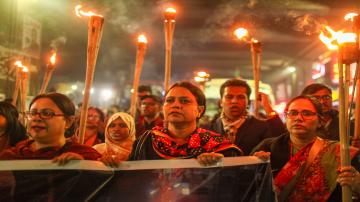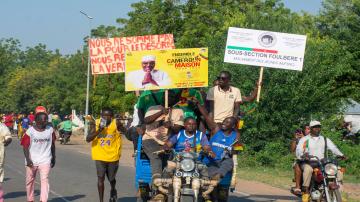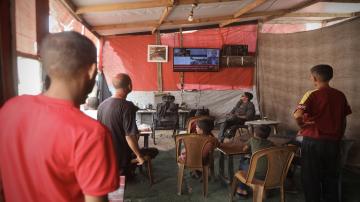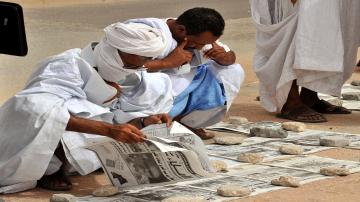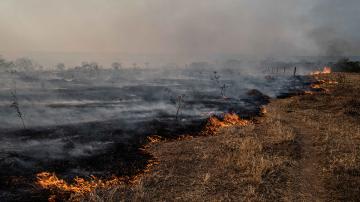Al Jazeera Journalism Review

Public Hostility Toward Legacy Media in Bangladesh
The December 2025 arson attacks on Prothom Alo and The Daily Star marked a turning point for journalism in Bangladesh. As public anger replaces state control as the primary threat, reporters are reassessing personal safety, editorial judgement, and professional credibility in a political transition where journalism itself is increasingly treated as an enemy.
Latest Articles
The Battle to Keep Journalists Alive in Gaza
Hungry journalists covering the story of starvation in Gaza, surviving on salt to stay alive, selling their work equipment to secure a “sack of flour” for their children, shedding the “shame” of publicly asking for food, and enduring the harshest media environment just to maintain “continuous coverage”.

Balancing Productivity and Privacy: How Female Journalists Use AI Chatbots
Female journalists in Jordan are harnessing AI chatbots to boost productivity, enhance digital safety, and find emotional support, but their growing reliance also raises critical concerns about privacy, ethics, and the responsible use of emerging technologies in journalism. This article explores how these tools are reshaping their workflows while navigating the challenges of trust and accountability.
From "Death Announcement" to "Eulogy": The Obituary as a Journalistic Genre
Obituaries for influential public figures have become a recognised journalistic genre, handled by seasoned reporters in major media outlets. How did this practice evolve, what defines it professionally, and how ethically acceptable is writing obituaries in advance?

Canadian Mainstream Media’s Orientalist Stance Towards Palestinians
Canadian mainstream media manufactures consent to support Israel through biased language, withholding historical context, and conflating any criticism of the Israeli state with antisemitism. When the Canadian mainstream media covers the question of Palestine, they usually frame it as a religious issue and withhold the historical and socio-political context.

Bias by Omission: How Israeli Occupation Crimes Are Filtered in Western Media
Western media coverage of the war on Gaza does not stop at bias in what it chooses to publish; it practices a deeper form of bias: bias by omission. Testimonies are excluded, massacres are marginalized, and the narrative is reshaped to serve a single version of events. This analysis explores how “gatekeepers” in Western newsrooms play a direct role in silencing the Palestinian voice and entrenching the Israeli narrative.

In the War on Gaza: How Do You Tell a Human Story?
After nine months of genocidal war on Palestine, how can journalists tell human stories? Which stories should they focus on? And does the daily, continuous coverage of the war’s developments lead to a “normalisation of death”?

Opinion
Arsalan Bukhari
Public Hostility Toward Legacy Media in Bangladesh
The December 2025 arson attacks on Prothom Alo and The Daily Star marked a turning point for journalism in Bangladesh. As public anger replaces state control as the primary threat, reporters are…
Salma Saqr
Migration Issues and the Framing Dilemma in Western Media
How does the Western press shape the migration narrative? Which journalistic frames dominate its coverage? And is reporting on anti-immigration protests neutral or ideologically charged? This…
Hisham Zakkout
From News Reporting to Documentation: Practical Lessons from Covering the War on Gaza
From the very first moment of the genocidal war waged by Israel on Gaza, Al Jazeera correspondent Hisham Zaqout has been a witness to hunger, devastation, war crimes, and the assassination of his…
Diaries
From News Reporting to Documentation: Practical Lessons from Covering the War on Gaza
From the very first moment of the genocidal war waged by Israel on Gaza, Al Jazeera correspondent Hisham Zaqout has been a witness to hunger, devastation, war crimes, and the assassination of his colleagues in the field. It is a battle for survival and documentation, one that goes beyond mere coverage and daily reporting.

A Sudanese Journalist in the Grip of the Rapid Support Forces
She was arrested, tortured, nearly raped, threatened with death, and subjected to degrading abuse. Her brother was brutally mistreated in an effort to locate her. In the end, her family had to pay a ransom to secure her release. She sought refuge abroad, but eventually returned to Sudan to continue documenting the war’s toll, particularly in El Fasher, a city now under siege. This is the harrowing account of a Sudanese journalist detained and tortured by the Rapid Support Forces.

Anas Al Sharif; Killed by Israel, but His Final Words Will Echo far Beyond His Death
For over a year and a half, Anas Jamal al-Sharif refused to leave northern Gaza, documenting the destruction and loss that others tried to hide. Tonight, Israel silenced his voice, but his final words, written on April 6, will echo far beyond his death.

Reports
Public Hostility Toward Legacy Media in Bangladesh
The December 2025 arson attacks on Prothom Alo and The Daily Star marked a turning point for journalism in Bangladesh. As public anger replaces state control as the primary threat, reporters are reassessing personal safety, editorial judgement, and professional credibility in a political transition where journalism itself is increasingly treated as an enemy.

Migration Issues and the Framing Dilemma in Western Media
How does the Western press shape the migration narrative? Which journalistic frames dominate its coverage? And is reporting on anti-immigration protests neutral or ideologically charged? This analysis examines how segments of Western media echo far-right rhetoric, reinforcing xenophobic discourse through selective framing, language, and imagery.
Polarised, Intimidated, Silenced: The Media Under Siege in Cameroon’s Election
Cameroon’s 2025 presidential election exposed a troubling paradox: a nation voting under the watchful eye of power, while its press remained silenced. From the arrest of a teenage reporter to bans on political debate and digital manipulation, freedom of expression is under siege, and journalism is on trial.

What Image of Gaza Will the World Remember?
Will the story of Gaza be reduced to official statements that categorise the Palestinian as a "threat"? Or to images of the victims that flood the digital space? And how can the media be transformed into a tool for reinforcing collective memory and the struggle over narratives?

Journalism in Mauritania: Behind the Facade of Press Freedom Indicators
Mauritania holds the top position in the Arab world in the Press Freedom Index published by Reporters Without Borders. However, behind this favourable ranking, the media and journalists face significant challenges, chief among them the ambiguity surrounding the definition of a "journalist" and the capacity of media professionals to fulfil their roles in accountability and oversight. Despite official efforts, the defining feature of Mauritania’s media landscape remains its persistent state of fluctuation.

How Can Journalism Make the Climate Crisis a People’s Issue?
Between the import of Western concepts and terminology that often fail to reflect the Arab context, and the denial of the climate crisis, or the inability to communicate it in clear, accessible terms, journalism plays a vital role in informing the public and revealing how climate change directly affects the fabric of daily life in the Arab world.







